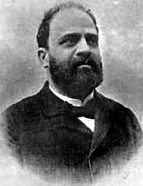

His path as an educator was plotted from 1871, when he took part in the famous Casino democratic conferences, held in the wake of the Questão Coimbrã, or controversy of 'Good Sense and Good Taste'. After Antero do Quental dealt with Portugal's decadence and Augusto Soromenho spoke scathingly on Portuguese literature, criticism reached its peak in the fifth lecture, given by Adolfo Coelho on 19 June 1871, on A Questão do Ensino (the Issue of Education). In it, he criticised the organisation, forms and types of education practiced in Portugal, in such terms that the authorities interdicted the continuation of the conferences, claiming they were introducing "doctrines and propositions that attacked religion and political institutions of the state" (Manual de Filologia Portuguesa, ‘Manual of Portuguese Philology’, 1977, p. 23). In fact, Coelho argued that the decline of education was due to the alliance between Church and State, which made imperative both the separation between them and the promotion of freedom of thought: "First, let us remember that we are in a country where Catholicism is the state religion imposed materially on the consciousness of all who are Portuguese: here the scientific spirit is thus driven out of everything under the immediate action of the state, chased out from it... In a word, the free search for truth is impossible in Portugal" (A Questão do Ensino. 1872, pp. 23-24).
Starting in the 1880s, an examination of his bibliography reveals a growing number of writings on the topics of education and children's literature, with emphasis on the dissemination of the ideas of German educator Friedrich Froebel, founder of Kindergarten. His relevant academic papers bore titles that speak for themselves on their content and the ideas engaging them in the programmatic concerns of the time: Os Elementos Tradicionais da Educação (Traditional Elements of Education, 1883), A reforma do Curso Superior de Letras (The Reform of Curso Superior de Letras, 1889), Esboço de um programa para o estudo antropológico, patológico e demográfico do povo português (Outline of a Program for the Anthropological, Pathological and Demographic Study of the Portuguese People, 1890), Proposta relativa a um inquérito do estado físico, moral e intelectual do povo português (Proposal on a Survey of the Physical, Moral and Intellectual State of the Portuguese People, 1890), Pedagogia do Povo Português (Pedagogy of Portuguese People, 1898), O estudo da criança (The Study of Children, 1913), Cultura e analfabetismo (Culture and Illiteracy, 1916). Alongside these are many writings that appeared in newspapers, revealing his desire to reach sections of the population quickly who did not have access to more specialised literature.
